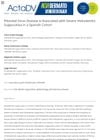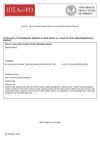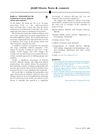Search
for
Sort by
Research
720-750 / 1000+ results
research Distribution of SALT Scores by Therapeutic Response in Patients with Severe Alopecia After 52 Weeks of Baricitinib Therapy
Baricitinib therapy helped many patients with severe alopecia regrow hair after 52 weeks.

research Outcomes of Down-Titration in Patients With Severe Scalp Alopecia Areata Treated With Baricitinib: An Update Through Week 152 From BRAVE-AA2
Reducing the dose of Baricitinib to 2mg still helped over half of the patients with severe scalp alopecia maintain their hair regrowth after two years.

research Pilonidal Sinus Disease Is Associated With Severe Hidradenitis Suppurativa in a Spanish Cohort
Pilonidal sinus disease is linked to more severe hidradenitis suppurativa.

research Real-Life Effectiveness and Tolerance of Baricitinib for the Treatment of Severe Alopecia Areata with 1-Year Follow-Up Data
Baricitinib effectively regrows hair in most people with severe alopecia, especially those with patchy hair loss, but hair may fall out again if treatment stops.

research Early Real-World Experience With Baricitinib in the Treatment of Severe Alopecia Areata
Baricitinib shows promise in treating severe hair loss.

research Efficacy and Safety of Proxalutamide in Severe or Critically Ill COVID-19 Patients: Study Protocol for an Exploratory Trial
The trial will test if proxalutamide is safe and effective in reducing death in severe COVID-19 patients.

research Efficacy and Safety of Baricitinib in Managing Severe Alopecia Areata: A 6-Month Real-World Experience
Baricitinib was effective and safe for severe hair loss treatment over 6 months.

research Multidisciplinary Treatment of Transgender Woman With Severe Gender Dysphoria and Comorbid Psychiatric Disorders - Case Report
The treatment helped a transgender woman stop drinking, improved her mental health, and reduced her gender dysphoria.

research Efficacy of Baricitinib in Patients With Different Degrees of Severe Alopecia Areata: 52-Week Results From BRAVE-AA1 and BRAVE-AA2
Baricitinib was effective in treating severe and very severe alopecia areata after 52 weeks.

research Cryo-EM and Molecular Dynamics of TRPV3 Channel in Activated State Reveal Structural Features Implicated in Severe Itch and Hyperkeratosis
The TRPV3 channel structure changes linked to severe itch and hyperkeratosis were identified using cryo-EM.

research A Brazilian Case of IFAP Syndrome With Severe Congenital Ichthyosis and Limb Malformations Caused by a Rare Variant in MBTPS2
A Brazilian male with IFAP syndrome has a unique genetic variant causing his condition.

research Complete Hair Regrowth in a Young Male With Severe Atopic Dermatitis and Alopecia Areata After Dupilumab: Probably More Than a Coincidence
Dupilumab led to complete hair regrowth and improved skin condition in a young man with severe eczema and hair loss.

research Re-Discovery of Trichophyton Bullosum in North Africa as a Cause of Severe Dermatophytosis in Donkeys
Trichophyton bullosum has been found causing severe skin infections in donkeys in North Africa for the first time since 1933.
research Compound Heterozygous Mutations in Forkhead Box N1 (FOXN1) Lead to Severe Immunodeficiency but Normal Hair and Nail Development in Patients
Mutations in the FOXN1 gene cause severe immune issues but don't affect hair and nails.

research Reply to: Tofacitinib for the Treatment of Severe Alopecia Areata and Variants
More extensive trials are needed to understand tofacitinib's role in treating severe hair loss.
research Supplementary Material for: Janus Kinase Inhibitors for the Treatment of Severe Alopecia Areata: An Open-Label Comparative Study
Ruxolitinib and tofacitinib are effective and safe for treating severe alopecia areata.

research Tofacitinib for the Treatment of Severe Alopecia Areata and Variants: A Retrospective Cohort Study of 90 Patients
Tofacitinib is effective and safe for treating severe alopecia areata and related conditions.
research Patients with Compound Heterozygous Mutations in Forkhead Box N1 Have Severe Immunodeficiency While Maintaining Normal Skin and Hair Development
Patients with certain FoxN1 gene mutations have severe immune issues but normal skin and hair.
research A 9-Month-Old Infant with Severe Scalp Dermatosis
The infant likely has Hay-Wells syndrome and needs genetic testing and heart screening.

research Oral Ruxolitinib Induces Hair Regrowth in Patients with Moderate-to-Severe Alopecia Areata
Ruxolitinib effectively regrows hair in most patients with severe hair loss.

research Tamsulosin Treatment for Benign Prostatic Hyperplasia and Risk of Severe Hypotension in Men Aged 40-85 Years in the United States: Risk Window Analyses Using Between and Within Patient Methodology
Tamsulosin for enlarged prostate may increase the risk of severe low blood pressure, especially when starting or restarting the medication.

research Zinc Deficiency Associated with Hypothyroidism: An Overlooked Cause of Severe Alopecia
Zinc supplements may be needed to treat hair loss in hypothyroidism.

research Early Onset of Androgenetic Alopecia Associated With Early Severe Coronary Heart Disease: A Population-Based, Case-Control Study
Early balding linked to higher heart disease risk.
research Two-Year Follow-Up of Two Patients After Severe Thallium Intoxication
Hair loss and polyneuropathy improved, but severe vision impairment persisted.

research Genome-Wide Meta-Analysis Implicates Mediators of Hair Follicle Development and Morphogenesis in Risk for Severe Acne
Genetic variations affecting skin structure play a key role in severe acne.

research A Randomized Placebo-Controlled Single-Center Pilot Study of the Safety and Efficacy of Apremilast in Subjects with Moderate-to-Severe Alopecia Areata
Apremilast was not effective in treating moderate-to-severe alopecia areata.
research Interest of High-Dose Pulse Corticosteroid Therapy Combined with Methotrexate for Severe Alopecia Areata: A Retrospective Case Series
Combining high-dose corticosteroids with methotrexate may be effective and safe for severe alopecia areata.

research Effect of Minoxidil on Blood Pressure and Hemodynamics in Severe Hypertension
research Combined Oral Pulse and Topical Corticosteroid Therapy for Severe Alopecia Areata in Children: A Long-Term Follow-Up Study
The combined therapy was effective and safe for children with severe alopecia areata.